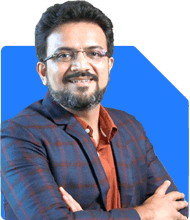Jigar Patel | Answer |Ask -Follow
Stock Market Expert - Answered on Feb 16, 2023
He has around seven years of experience in the stock markets and specialises in sharing outlooks based on technical analysis.
Patel has a PGPM (Finance) certification from the International Institute of Finance Markets.... more

I have DCB 600 @118 ; Union Bank 1500 @91 ; Bank of India 800 @ 95
You may like to see similar questions and answers below
Jigar Patel | Answer |Ask -Follow
Stock Market Expert - Answered on Apr 18, 2024
Samraat Jadhav |2314 Answers |Ask -Follow
Stock Market Expert - Answered on Jun 09, 2023
Samraat Jadhav |2314 Answers |Ask -Follow
Stock Market Expert - Answered on Apr 30, 2024
Radheshyam Zanwar |2860 Answers |Ask -Follow
MHT-CET, IIT-JEE, NEET-UG Expert - Answered on Jun 07, 2025
Radheshyam Zanwar |2860 Answers |Ask -Follow
MHT-CET, IIT-JEE, NEET-UG Expert - Answered on Jun 07, 2025
Radheshyam Zanwar |2860 Answers |Ask -Follow
MHT-CET, IIT-JEE, NEET-UG Expert - Answered on Jun 07, 2025
Radheshyam Zanwar |2860 Answers |Ask -Follow
MHT-CET, IIT-JEE, NEET-UG Expert - Answered on Jun 07, 2025
Radheshyam Zanwar |2860 Answers |Ask -Follow
MHT-CET, IIT-JEE, NEET-UG Expert - Answered on Jun 07, 2025
Radheshyam Zanwar |2860 Answers |Ask -Follow
MHT-CET, IIT-JEE, NEET-UG Expert - Answered on Jun 07, 2025
Radheshyam Zanwar |2860 Answers |Ask -Follow
MHT-CET, IIT-JEE, NEET-UG Expert - Answered on Jun 07, 2025
Radheshyam Zanwar |2860 Answers |Ask -Follow
MHT-CET, IIT-JEE, NEET-UG Expert - Answered on Jun 07, 2025
Radheshyam Zanwar |2860 Answers |Ask -Follow
MHT-CET, IIT-JEE, NEET-UG Expert - Answered on Jun 07, 2025
Radheshyam Zanwar |2860 Answers |Ask -Follow
MHT-CET, IIT-JEE, NEET-UG Expert - Answered on Jun 07, 2025



















